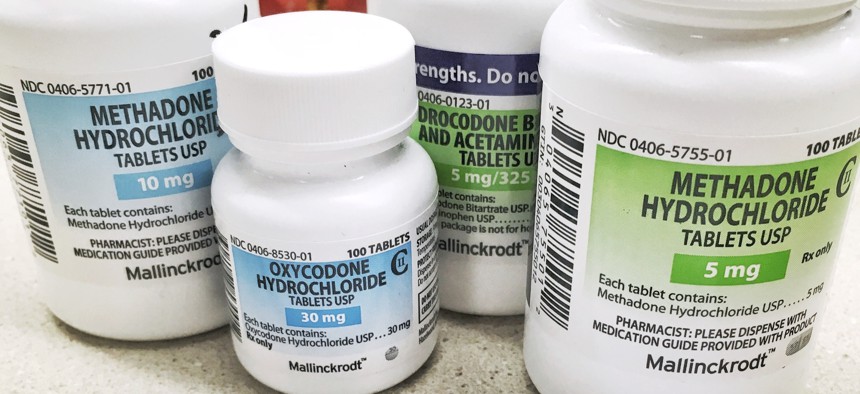Trump Didn’t Declare the Opioid Crisis a National Emergency. What If He Had?

Shutterstock

Connecting state and local government leaders
The president hasn’t yet used his powers under the Stafford Act, something his own special commission has said is its “most urgent recommendation.”
When President Trump announced on Tuesday that he would be holding a “major briefing on the opioid crisis” at his private golf club in Bedminster, New Jersey, many suspected that he might use the briefing as an opportunity to follow the preliminary recommendations of the White House commission on opioids and declare a state of national emergency in response to the epidemic.
That is not what happened.
Trump—who made combating the opioid crisis a major campaign message during the 2016 election cycle—instead proposed that the best way to address addiction and overdose is to craft prevention strategies around “talking to youth and telling them, ‘No good; really bad for you’ in every way.”
Following the event, U.S. Health and Human Services Secretary Tom Price and White House counselor Kellyanne Conway addressed the press, giving brief remarks around the statistics of the ongoing epidemic, and painting a picture of the steps the Trump administration is considering taking to address it.
These steps included fostering National Institutes of Health research on pain medication, providing best practices to state and local governments and beefing up the collection of data on the problem. The strategies listed by Price, however, did not include the declaration of a national emergency.
When asked why the administration had not yet declared an emergency under the Public Service Health Act or the Stafford Act, a step Trump’s own opioid commission deemed its "first and most urgent recommendation,” Price responded by asserting that solutions to the epidemic can be found without the federal government first having to take this step.
“We believe that as this point that the resources that we need, or the focus that we need, to bring to bear to the opioid crisis at this point can be addressed without the declaration,” said Price, who went on to clarify that such a declaration cannot be completely ruled out. “All things are on the table for the president,” Price added.
If the president were to declare a state of emergency it would have two primary effects that are relevant to state governments.
First, an emergency declaration would allow states that are declared disaster zones—areas that have been particularly hard-hit by the crisis—to receive funds from the federal Disaster Relief Fund, which as of June 30, 2017, had a balance of nearly $4.4 billion.
Those additional funds could be used for treatment, overdose medication, preventative efforts and more. The Federal Emergency Management Agency would coordinate the administration of those resources. In that case the governor of the affected state typically must first respond to the crisis and execute their state’s own response plan before they may request additional federal emergency funds.
And, if the Trump administration declares an emergency under both the Stafford Act and Section 319 of the Public Health Service Act, it would allow temporary waivers on specific rules regarding federal programs like Medicare, Medicaid and CHIP. For example, Medicaid does not currently reimburse the costs of receiving drug treatment in facilities that have more than 16 beds. Many states have already applied for waivers on this rule, but an emergency declaration could give a blanket waiver to all 50 states.
In an interview on CNN’s “State of the Union” on Sunday, New Jersey Gov. Chris Christie, the chairman of the White House commission on the opioid crisis, said he had received a “really good response from the White House” on his group’s recommendations.
“He’s taking this commission seriously, as we are. And we make some very aggressive recommendations. And I’m confident he will adopt them,” Christie added.
In that same conversation, Christie pointed out that the death rate from drug overdoses is currently equivalent to a “9/11-scale loss of life every three weeks.”
“If that’s not a health emergency,” Christie said, “I don’t know what is.”
Quinn Libson is a Staff Correspondent for Government Executive’s Route Fifty based in Washington, D.C.

NEXT STORY: Why Cities and Counties Need to Monitor the Sagging Retail Sector





